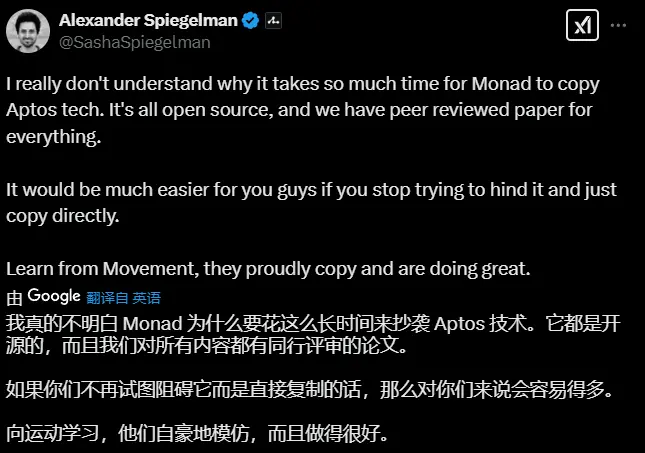Author: Luke, Mars Finance
In February 2025, a fierce debate erupted in the blockchain field surrounding technological originality and open-source ethics. Alexander Spiegelman, the research director of Aptos, publicly accused Monad of plagiarizing its core technology, particularly the BlockSTM dynamic parallel execution framework, and claimed that Monad did not adequately acknowledge Aptos's open-source contributions during its development process. He pointed out that Aptos's technologies (such as pipeline design and decoupled execution architecture) have been publicly disclosed through multiple peer-reviewed papers, while Monad's BlockSTM "is highly similar to AptosBFT," even suggesting that Monad "spent a lot of time reverse engineering rather than original development."

In response, Monad co-founder James Hunsaker strongly rebutted, stating that the underlying logic of BlockSTM originates from software transactional memory (STM) and the optimistic concurrency control (OCC) theory proposed in 1979, emphasizing that he had researched related technologies in the Haskell environment long before and had never referenced Aptos code. He sarcastically remarked, "If Aptos hadn't stirred up the dispute, I wouldn't even have thought of this project."
Technical Comparison: BlockSTM vs. AptosBFT
The core differences between BlockSTM and AptosBFT can be analyzed from three aspects: design philosophy, technological lineage, and performance metrics.
Design Philosophy — AptosBFT is optimized based on the HotStuff consensus algorithm, emphasizing dynamic parallel execution and state synchronization efficiency, enhancing throughput through pipelined processing. In contrast, BlockSTM adopts an optimistic parallel execution strategy, processing transactions concurrently before validation, relying on superscalar pipeline technology to reduce hardware dependency, aiming for single-slot finality.
Technological Lineage — Aptos claims its technology stems from a deep transformation of the Move language and Byzantine Fault Tolerance (BFT) mechanisms; whereas Monad emphasizes that BlockSTM is an extension of traditional STM theory on EVM-compatible chains, with no direct connection to Aptos.
Performance Metrics — Aptos currently has a TPS of about 15,000, while Monad claims it can reach 100,000, but neither has fully disclosed stress test data, and actual performance remains to be verified.
Community Reaction: Division and Rationality Intertwined
This controversy has led to polarization within the blockchain community. Supporters of Aptos argue that Monad's EVM-compatible solution has "design coincidences" with Aptos's Move virtual machine, calling for stricter open-source citation standards. Meanwhile, supporters of Monad point out through testnet data that Monad's asynchronous I/O and state database optimizations are distinctly different from Aptos, questioning the originality of Aptos's technology. Neutral researcher Elena Stark wrote that the similarities between BlockSTM and AptosBFT reflect a convergence of industry technology, calling for the open-source ecosystem to focus more on collaboration rather than opposition.
Monad Project Progress: Ambition and Challenges Coexist
Despite the ongoing controversy, Monad's technological roadmap and ecosystem development continue to advance steadily. In the fourth quarter of 2024, Monad launched a custom database, MonadDB, based on Patricia Trie, improving state storage compression efficiency by 40%. Additionally, Monad achieved single-second block confirmation on the testnet, lowering the hardware threshold for verification nodes to 16-core CPU + 64GB RAM, attracting participation from small and medium-sized mining pools.
In terms of ecosystem expansion, the Monad Foundation's ecological fund has reached $200 million, focusing on supporting DeFi and gaming applications. In January 2025, the derivatives protocol NovaX and the blockchain game MetaCivic announced their migration to Monad. At the same time, Monad's developer toolkit, Monad SDK, has surpassed 500,000 downloads, compatible with Hardhat and Truffle frameworks, reducing the cost for Ethereum developers to migrate.
Industry Impact: Paradigm Reflection of the Open-Source Ecosystem
This controversy has exposed three deep-seated issues within the blockchain industry:
- Definition of intellectual property in open-source protocols: Does code publication mean that technological ideas can be freely copied? Spiegelman's accusations essentially represent a struggle over "the attribution of technological influence," while Hunsaker's rebuttal highlights the blurred boundaries between academic theory and engineering practice.
- Sustainability of performance competition: Both Aptos and Monad tout high TPS as a selling point, but the market is more concerned with the maturity of the ecosystem rather than mere performance metrics. Aptos's developer growth rate in 2024 was 96%, while Monad's ecological applications numbered less than a hundred, reflecting this point.
- Transparency of community governance: The power of the Monad Foundation is concentrated in the founding team, raising questions about "decentralization"; while Aptos employs DAO governance, key decisions are still led by core developers.
Future Outlook: Competition or Symbiosis?
In the short term, the controversy may intensify the opposition between Aptos and Monad. Aptos may seek to patent some technologies to solidify its barriers, but this could affect its open-source image; meanwhile, Monad needs to accelerate ecosystem development to prove its innovative capabilities. If performance promises are not fulfilled, Monad may face a predicament similar to Core DAO.
In the long run, Aptos and Monad may pursue differentiated development. Aptos will delve deeper into the Move ecosystem, expanding financial and compliance scenarios (such as cross-border settlement cooperation with Visa); while Monad will attract Ethereum developers with EVM compatibility, focusing on high-frequency trading and gaming, among other high-performance demand areas.
This controversy will ultimately serve as a footnote in the evolution of blockchain technology, but the discussions it has sparked regarding open-source ethics will drive the industry to establish clearer standards for technological lineage and collaboration frameworks. As Hunsaker stated, "Code can be copied, but ecosystems cannot be plagiarized."
免责声明:本文章仅代表作者个人观点,不代表本平台的立场和观点。本文章仅供信息分享,不构成对任何人的任何投资建议。用户与作者之间的任何争议,与本平台无关。如网页中刊载的文章或图片涉及侵权,请提供相关的权利证明和身份证明发送邮件到support@aicoin.com,本平台相关工作人员将会进行核查。




